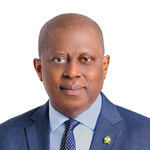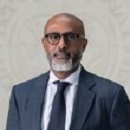|
Location: Cedar Hall, HQ1-1-660
![]() Click here for the photos
Click here for the photos
OVERVIEW
The new administration under President Tinubu has set out on an ambitious reform path to restore macroeconomic stability and develop a pro-growth reform agenda, including fuel subsidy reforms and unifying the various official foreign exchange windows during the first months in office.
REPORT
Key Points:
Regaining macroeconomic stability and trust. When Governor Cardoso took the helm of Nigeria’s central bank about six months ago, Nigeria’s currency naira was under great depreciation pressure. The new administration has set out on an ambitious reform path to restore macroeconomic stability, regain market confidence, tame soaring inflation, and stabilize the plummeting currency. Well-sequenced reforms and building back the trust with all stakeholders will be fundamental to achieve these goals. The central bank has committed to go back to the orthodox monetary policy and stop FX interventions to support the exchange rate except for excess volatility episodes. It will also strive for good coordination between the monetary and fiscal policies.
Open dialogue. Monetary policy and exchange rate are complex issues, even for the most enlightened observers, and thus continuous dialogue and communication are essential in helping the public understand actions taken by the central bank and their rationale. Open dialogue has given people hope in the exchange rate and helped the local currency perform much better in recent months. Efforts are also being made to strengthen the communication mechanisms already in place.
Quotes:
“Whatever policies you make, if they don’t impact the man on the street, then you haven’t done anything.” Olayemi Cardoso
“It is clear to me that trust is so critical in successfully anchoring a major task.” Olayemi Cardoso
Blurb:
How has Nigeria’s central bank made strides in managing the currency risk and fostering market confidence in light of the multiple challenges facing the country? Commitment to well-sequenced reforms is key, along with continuous open dialogue with various stakeholders.
Contributor: Danny Xufeng Jiang
SPEAKER

Mr. Olayemi Cardoso
Governor of the Central Bank of Nigeria
Mr. Olayemi Cardoso assumed the role of Governor of the Central Bank of Nigeria (CBN) on October 5, 2023. His tenure has been marked by a commitment to price stability, transparency, and the restoration of investor confidence.
Before assuming his role at the CBN, Mr. Cardoso amassed over 29 years of experience in commercial banking. Notably, he served as Chairman of Citibank Nigeria Ltd, a subsidiary of a leading global bank and the oldest international bank in Nigeria, from 2010 to 2022. Prior to this, he held the position of Executive Director at Citizens International Bank Limited from 1990 to 1997 and served as Principal Partner at FBC Associates Limited from 1997 to 1999.
Mr. Cardoso served as Commissioner for Economic Planning and Budget, Lagos State Government, from 1999 to 2005. In that capacity, he implemented the blueprint which catalysed economic development in the state and championed reform, pioneering state-of-the-art analytical and consultative mechanisms for improving governance.
During his banking and public sector career, he served as Chairman of the Lagos Economic Summit Group (2020-2021) and the Africa Venture Philanthropy Alliance (AVPA), 2014 – 2020. He also served as a member of the Economic Advisory Council of the Federal Republic of Nigeria (2015 – 2019) and Cities Alliance Think Tank (2015 – 2018). Other private sector positions held by Mr. Cardoso during his career include Board membership of Chevron Oil Plc (2005 – 2008), Nigerian National Advisory Board for Impact Investing, Lagos Business School, Institution of the Annual State Economic Summit, Johnson Products, and DRASA Health Trust.
Mr. Cardoso graduated from the University of Aston in Birmingham, United Kingdom, in 1980 with a Bachelor of Science in Managerial and Administrative Studies (Concentration in Finance and Accounting) and subsequently pursued his master’s in Public Administration and Management (Concentration in Economics and Finance) from Harvard University, Massachusetts, United States of America in 2005. Mr. Cardoso was conferred with a Doctorate in Business Administration (DBA) (honoris causa) by the University of Aston in Birmingham, 2017 in recognition of his outstanding achievements in the private and public sectors. He is also a Fellow of the Chartered Institute of Stockbrokers.
MODERATOR

Abebe Aemro Selassie
Director of the African Department
IMF
Abebe Aemro Selassie is the Director of the African Department, where he oversees the IMF’s operations and engagement with 45 countries across sub-Saharan Africa.
Under his leadership the IMF has disbursed some $51 billion to support the post pandemic recovery and foster greener more inclusive growth. Working tirelessly alongside the region’s leaders Mr. Selassie strives to strengthen the region’s financial architecture and support Africa reaching its true potential.
Before taking up his current position in 2016, Mr. Selassie gained extensive experience in a wide-ranging career at the IMF. He held various senior positions, including Deputy Director in the African Department, Mission Chief for Portugal during the Euro Area Crisis and South Africa. He has served as the IMF’s Senior Resident Representative in Uganda and earlier in his career, he worked on the Fund’s lending programs with Turkey, Thailand, Romania and Estonia. While in the Strategy, Policy and Review Department he was deeply involved in low-income country and emerging-market programs and policy design issues.
Before joining the IMF in 1994, he worked for the Government of Ethiopia as Principal Economist in the Office of the President and at the Economist Intelligence Unit in London.